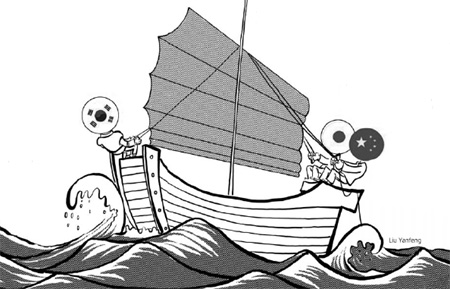
|
CHINA> Opinion
 |
|
Related
Time East Asia learnt from unity proverb
By Feng Zhaokui (China Daily)
Updated: 2009-10-21 13:50
 There are differences, most often than not minor, among member states of all regional, continental and inter-continental groups. But such groups still bring benefits to all its members and act as a forum to resolve their differences and disputes. The European Union (EU) is perhaps the best example of such a group. The efforts of China, Japan and the Republic of Korea (ROK) to build an "East Asian Community" (EAC) should be seen in this light, and it is for the critics now to see the obvious advantages it would bring to the three countries. State leaders met at the Second China-Japan-ROK Summit in Beijing on Oct 10 and exchanged views on a wide array of subjects. Their discussions ranged from issues of common concern, including denuclearization of the Korean Peninsula and resumption of the Six-Party Talks, to trade and commerce. The three countries promised to make unremitting efforts toward establishing an EAC, too, which would be based on openness, transparency and catholicity.
It is an irony of sorts to see Japan entering a phase of "hot politics but cold media" over the Democratic Party of Japan's (DPJ) Asia policy after Prime Minister Yukio Hatoyama assumed office. Shockingly, some media outlets do not even try to hide their bias. It is painful to see in the Japanese media remarks like "the thought of setting up a community of East Asian countries is a fantasy", "China is eager to snatch the leadership of a future EAC", "China intends to use the strategy of building an EAC to eliminate US influence, seek regional hegemony and even try to resume its 'tributary system'", "it is dangerous that Hatoyama's Cabinet has turned a blind eye to the 'China threat' and not paid attention to national defense". Such remarks only prove that a section of the Japanese media and some commentators lack the foresight of Haotoyama, and cannot think about the long-term interests of their country and the region. We can only hope that the mainstream Japanese opinion does not conform to the views of the biased critics. True, East Asian countries have their differences and conflicts, especially over territorial and maritime sovereignty. But it is also true that the disputes can be resolved through cooperation. So why can't we work together to settle our disputes and build a strong and mutually beneficial regional community? China, Japan and the ROK have indeed been cooperating more closely in various areas through multilateral dialogues and other mechanisms since 1999, and the fruits of their efforts are there for all to see. The three countries have strengthened their communication and are coordinating more closely in regional and international affairs, which in turn can pave the way for them to resolve their mutual disputes. During the past decade, the heightened pragmatic cooperation among the three nations has shown that they are working with unflinching resolve to make a blueprint for a regional community, which would prove the idea of an EAC is not a "fantasy". In the Report on Sino-Japanese Relations, published in 2006, I said the East Asian cooperation model needs no "dominant country", and China and Japan both should recognize that pursuing "leadership" only would lead to nowhere. So when the Japanese media cry foul over "leadership" of a regional cooperation, are they clear what "leadership" is? Leadership has nothing to do with the sequence in which the countries' names appear on paper, for every country prefers putting its name first when it talks about a three-way, or for that matter multilateral, cooperation. Only later-day historians can judge which country contributed the most toward integrating the East Asian region, and for that we first have to have a regional community. Only when an EAC is established can its members compete for its "leadership". Germany and France put forward the idea of EU, but today all its member states get a chance to provide its leadership. Another fear that the Japanese media is trying to instill among the country's leaders and people is that China is out to oust the US from East Asia. What it forgets conveniently is that the economies of East Asian countries and the US are highly interdependent, and excluding the US from the region can only harm their interests, which no country would like to do. The principles of openness, transparency and catholicity espoused for an EAC means we will be "open and transparent to the US". On the other hand, an EAC would only increase the US' interests in the region because it needs a larger market to feed its economy that is marked by the most advanced technology in the world. The author is a researcher at the Institute of Japanese Studies, affiliated to the Chinese Academy of Social Sciences. |